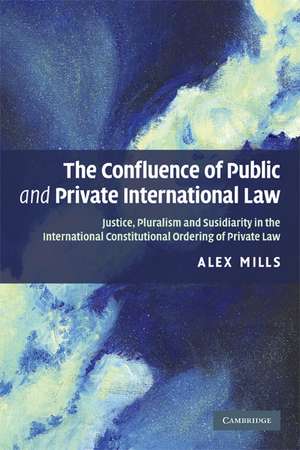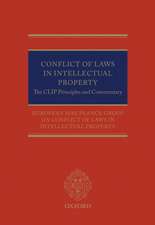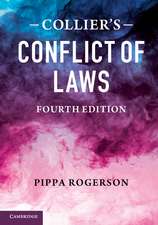The Confluence of Public and Private International Law: Justice, Pluralism and Subsidiarity in the International Constitutional Ordering of Private Law
Autor Alex Millsen Limba Engleză Paperback – iul 2009
Preț: 434.50 lei
Nou
Puncte Express: 652
Preț estimativ în valută:
83.15€ • 86.15$ • 69.40£
83.15€ • 86.15$ • 69.40£
Carte tipărită la comandă
Livrare economică 21 martie-04 aprilie
Preluare comenzi: 021 569.72.76
Specificații
ISBN-13: 9780521731300
ISBN-10: 0521731305
Pagini: 420
Dimensiuni: 153 x 228 x 19 mm
Greutate: 0.66 kg
Editura: Cambridge University Press
Colecția Cambridge University Press
Locul publicării:Cambridge, United Kingdom
ISBN-10: 0521731305
Pagini: 420
Dimensiuni: 153 x 228 x 19 mm
Greutate: 0.66 kg
Editura: Cambridge University Press
Colecția Cambridge University Press
Locul publicării:Cambridge, United Kingdom
Cuprins
1. Justice, pluralism and the international perspective; 2. The private history of international law; 3. From positivism to constitutionalism; 4. Private international law and constitutional law in federal systems; 5. The confluence of public and private international law; 6. Conclusions.
Recenzii
'This is a highly interesting and persuasive work, exploring themes and ideas that have either never gained the mainstream approval of private international (or public international) scholars, or that simply have never been examined in such detail before … highly recommended.' conflictoflaws.net
'Alex Mills is one of a new generation of scholars who take seriously the global legal pluralism they see around them rather than futilely seeking its elimination. In his detailed and useful book, The Confluence of Public and Private International Law, Mills convincingly argues that so-called 'public' and 'private' international law are two sides of the same coin and always have been. … There is much to like in this book. Mills is thorough in his survey of legal doctrine from the United Kingdom, the United States, Canada, Australia and the European Union. He does a nice job with the history of private international law and its derivation from law of nations concepts. And he successfully analyses the relationship between private international law doctrines and the fragmented authority intrinsic to federalist systems. Indeed, he even goes so far as to argue that the constitutional ordering in a federalist system holds useful lessons in designing a quasi-constitutionalist structure for analysing transnational conflicts questions. Although such links between federalism and global legal pluralism have been explored by others, Mills makes a worthwhile contribution to this burgeoning literature. … I expect that all such future work will benefit from his insights.' Transnational Legal Theory
'First, and possibly most importantly, [Mills' contribution] is extremely well written, well argued and well researched. Secondly, it employs an approach to private international law which can be summed up as 'back to basics', stripping away the layers of case law and jurisprudence to re-evaluate what private international law is for. Thirdly, there is every likelihood that Mills will be one of those very rare creatures: a genuine scholar of both public and private international law, in the way that perhaps only Dr Mann and Lord Collins of Mapesbury (as he now is) have been in recent times.' Lloyd's Maritime and Commercial Law Quarterly
'Mills has produced a thesis of high quality, which will repay careful attention. Private international lawyers … will benefit hugely from being asked to re-examine their subject from its very foundations up … His book is well indexed, well proofed and contains an invaluable bibliography, which will point the curious reader to many sources on the theoretical bases of private international law which otherwise receive rare attention in England. There is an additional advantage to the book's having been published by CUP: it is eminently affordable, not only academics in a time of university funding cuts, but also to intellectually inquisitive graduate students who want to go beyond the traditional subject-by-subject constraints.' C. J. S. Knight, Lloyd's Maritime and Commercial Law Quarterly
'In this important new book, Alex Mills, Slaughter and May Lecturer in Law at Selwyn College, Cambridge, marshals a grand historical narrative of the relationship between public and private international law and a detailed analysis of the constitutional dimensions of private international law in federal systems, in support of his case for a renewed 'international systemic' conception of private international law to service a coherent, 'harmoniously pluralist' international legal order … The Confluence of Public and Private International Law is an impressive and very welcome scholarly contribution.' Jacco Bomhoff, International and Comparative Law Quarterly
'… [this] book is to be saluted as one of the most significant and stimulating efforts towards bridging the gap between public and private international law and clarifying the grounds supporting the idea of a common basis for these two fields of international law.' Fausto Pocar, Netherlands International Law Review
'Alex Mills is one of a new generation of scholars who take seriously the global legal pluralism they see around them rather than futilely seeking its elimination. In his detailed and useful book, The Confluence of Public and Private International Law, Mills convincingly argues that so-called 'public' and 'private' international law are two sides of the same coin and always have been. … There is much to like in this book. Mills is thorough in his survey of legal doctrine from the United Kingdom, the United States, Canada, Australia and the European Union. He does a nice job with the history of private international law and its derivation from law of nations concepts. And he successfully analyses the relationship between private international law doctrines and the fragmented authority intrinsic to federalist systems. Indeed, he even goes so far as to argue that the constitutional ordering in a federalist system holds useful lessons in designing a quasi-constitutionalist structure for analysing transnational conflicts questions. Although such links between federalism and global legal pluralism have been explored by others, Mills makes a worthwhile contribution to this burgeoning literature. … I expect that all such future work will benefit from his insights.' Transnational Legal Theory
'First, and possibly most importantly, [Mills' contribution] is extremely well written, well argued and well researched. Secondly, it employs an approach to private international law which can be summed up as 'back to basics', stripping away the layers of case law and jurisprudence to re-evaluate what private international law is for. Thirdly, there is every likelihood that Mills will be one of those very rare creatures: a genuine scholar of both public and private international law, in the way that perhaps only Dr Mann and Lord Collins of Mapesbury (as he now is) have been in recent times.' Lloyd's Maritime and Commercial Law Quarterly
'Mills has produced a thesis of high quality, which will repay careful attention. Private international lawyers … will benefit hugely from being asked to re-examine their subject from its very foundations up … His book is well indexed, well proofed and contains an invaluable bibliography, which will point the curious reader to many sources on the theoretical bases of private international law which otherwise receive rare attention in England. There is an additional advantage to the book's having been published by CUP: it is eminently affordable, not only academics in a time of university funding cuts, but also to intellectually inquisitive graduate students who want to go beyond the traditional subject-by-subject constraints.' C. J. S. Knight, Lloyd's Maritime and Commercial Law Quarterly
'In this important new book, Alex Mills, Slaughter and May Lecturer in Law at Selwyn College, Cambridge, marshals a grand historical narrative of the relationship between public and private international law and a detailed analysis of the constitutional dimensions of private international law in federal systems, in support of his case for a renewed 'international systemic' conception of private international law to service a coherent, 'harmoniously pluralist' international legal order … The Confluence of Public and Private International Law is an impressive and very welcome scholarly contribution.' Jacco Bomhoff, International and Comparative Law Quarterly
'… [this] book is to be saluted as one of the most significant and stimulating efforts towards bridging the gap between public and private international law and clarifying the grounds supporting the idea of a common basis for these two fields of international law.' Fausto Pocar, Netherlands International Law Review
Notă biografică
Descriere
An analysis of the relationship between private international law, examined from an international systemic perspective, and public international law.













